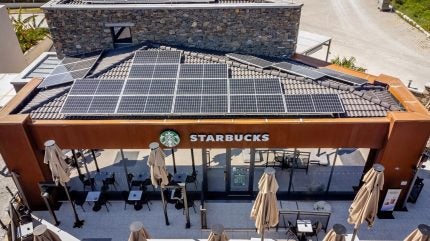
Starbucks announced it has achieved a significant milestone in its sustainability efforts, certifying more than 6,000 stores as ‘Greener Stores’ across 44 markets worldwide.
This nearly doubles the number of certified stores in one year and brings Starbucks closer to its goal of 10,000 Greener Stores by 2025.
Environmental impact through innovative design
Starbucks’ Greener Stores are designed and operated to minimise their environmental impact.
Each store meets specific standards across eight areas developed with the World Wildlife Fund and SCS Global Services.
These areas include water stewardship, energy efficiency, waste reduction, and the use of renewable energy.
In the US alone, Greener Stores have yielded substantial cost savings while reducing water use and energy consumption by 30% each compared to standard Starbucks stores.
Spreading sustainability across the globe
The Greener Stores initiative extends to new markets such as India, Hong Kong, and Costa Rica.
Notably, Starbucks’ first and only coffee farm in Costa Rica boasts a Greener Stores-certified visitor centre café.
Starbucks’ 2023 Greener Stores of the Year
To recognise exceptional performance in sustainability, Starbucks has launched its inaugural Greener Stores of the Year programme.
Six stores, one from each of its global regions, were awarded for exceeding expectations in innovation and environmental impact.
The Lima, Peru store champions reusable cups and local sourcing while the Tsushima, Japan store integrates seamlessly with its park surroundings and fosters community engagement.
Starbucks’ Cesme, Turkey store utilises natural materials, rainwater harvesting, and on-site solar power to achieve energy efficiency.
The Williamsburg, US store, located in a historic building, relies on 100% local renewable energy and offers customers information about sustainable choices.
In India, the Ayali Kalan store promotes electric vehicle charging, rainwater harvesting, and coffee ground reuse.
Finally, the Shanghai, China store demonstrates leadership in recycled and recyclable materials and energy-saving technologies.
Looking ahead
Starbucks’ commitment to sustainability is evident in the rapid expansion of its Greener Stores programme.
By recognising top-performing stores and implementing innovative practices, Starbucks is setting a strong example for the coffee industry and beyond.



